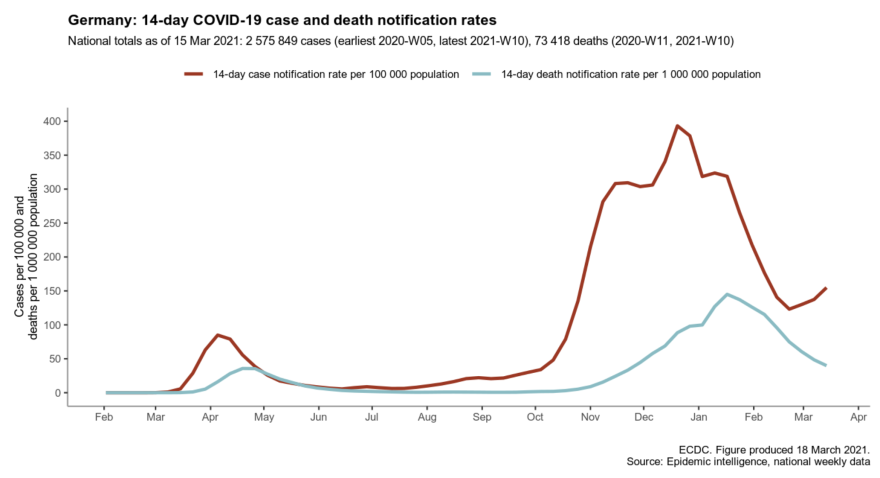German Health Minister Jens Spahn is telling Germans to diligently follow coronavirus safety rules, warning that vaccines won't arrive quickly enough to prevent a third wave of the COVID-19 pandemic. New infections in Germany are rising at a "very clearly exponential rate," Spahn said.
"There are not yet enough vaccine doses in Europe to stop the third wave by vaccination alone," Spahn said at a news conference Friday, according to a translation by Deutsche Welle. "Even if the deliveries from EU orders come reliably, it will still take a few weeks until the risk groups are fully vaccinated."
Germany's infection rate is rising at a pace not seen since the record spike it endured in December and January. The numbers fell sharply in February, but they're now curving upward again as Germany enters a third wave of the pandemic, propelled by new variants and infections among people younger than 65.
With Germany set for a four-day-weekend in early April due to the Easter holiday, Spahn said the country isn't ready to relax travel and physical distancing rules. In fact, he said, Germans should be prepared to revert to tighter restrictions.

Overall, the country has reported 2,639,258 total coronavirus cases and 74,405 deaths.
"Health experts are calling on the German government to order a third lockdown to prevent hospitals from being overrun," NPR's Rob Schmitz reports from Berlin.
German Chancellor Angela Merkel is set to meet with the governors of Germany's 16 states on Monday, when they will discuss whether to reinstate lockdown conditions.
Germany and other European countries resumed administering the AstraZeneca COVID-19 vaccine on Friday after the European Medicines Agency reiterated that the vaccine is "safe and effective" in fighting the coronavirus.
As it tries to boost its vaccine campaign, Germany is also moving ahead with talks to acquire Russia's Sputnik V vaccine — with or without the rest of the EU's involvement.
Spahn said Friday that he believes a deal with Russia could be reached quickly once a delivery amount is agreed upon.
"I am actually very much in favor of us doing it nationally if the European Union does not do something," he added, according to Deutsche Welle.
Across the EU, member nations have reported 24,175,984 confirmed coronavirus cases and 577,310 deaths, according to the European Center for Disease Prevention and Control.
Copyright 2021 NPR. To see more, visit https://www.npr.org. 9(MDAxODc1NzUzMDEyMTgyMjc0NzUxZmVhMQ004))



